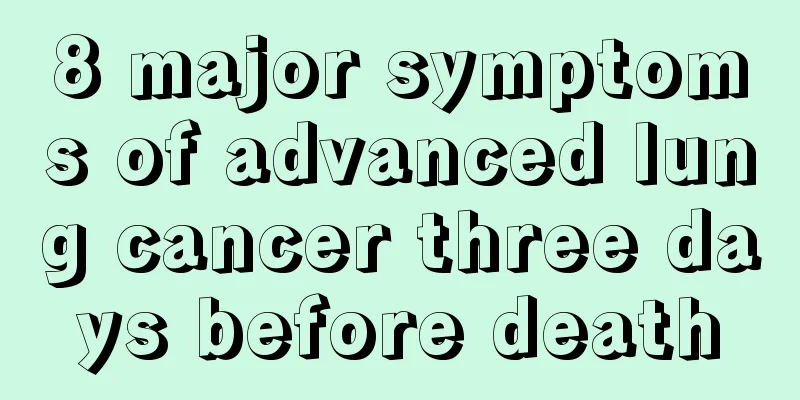8 major symptoms of advanced lung cancer three days before death

|
There are no absolute eight major symptoms before death in the late stage of lung cancer. Patients with advanced lung cancer may experience a variety of symptoms three days before death, including difficulty breathing, severe pain, confusion, extreme fatigue, coughing up blood, loss of appetite, etc. These symptoms may indicate that the patient is in the terminal stage of the disease. It is recommended to seek medical attention in time and take appropriate treatment measures according to the doctor's advice according to different situations. The details are as follows: 1. Breathing difficulties: Patients may experience severe breathing difficulties, with breathing becoming shallow and rapid. Advanced lung cancer is often accompanied by severe damage to lung function, leading to breathing difficulties. Use oxygen therapy or medication to relieve breathing difficulties, maintain indoor air circulation, and try to make the patient feel comfortable. 2. Severe pain: Patients may feel severe chest pain or pain in other parts of the body. The spread of cancer cells may compress nerves or bones, causing severe pain. Use analgesics, such as morphine and other strong painkillers, under the guidance of a doctor, and adjust the dosage of the drug to control the pain if necessary. 3. Confusion: The patient may be confused, drowsy, or unable to wake up. Metabolic abnormalities caused by tumors or side effects of drugs may cause confusion. Ensure that the patient is in a comfortable environment, reduce interference, and give sedatives if necessary to maintain the patient's tranquility. 4. Extreme fatigue: The patient will feel extremely tired and almost have no strength. Cancer consumes a lot of physical energy, and coupled with the side effects of treatment, the patient is prone to fatigue. Try to let the patient rest, reduce physical exertion, and provide high-calorie, easily digestible food and liquid nutritional support. 5. Coughing up blood: The patient may cough up bloody sputum or blood clots. Tumor erosion of lung tissue may cause bleeding. Keep the patient's airway open, use hemostatic drugs under the guidance of a doctor if necessary, and monitor the bleeding. 6. Loss of appetite: The patient may experience an extreme loss of appetite or no desire to eat at all. Advanced cancer is often accompanied by loss of appetite. Provide easily digestible liquid food to ensure that the patient has adequate nutritional intake and use nutritional supplements if necessary. In order to relieve these symptoms and improve the patient's comfort, family members and medical staff should take appropriate measures, such as the use of oxygen therapy, analgesics, nutritional support, etc. At the same time, it is recommended to seek medical treatment in time and take targeted treatment measures under the guidance of a doctor to ensure that the patient receives the best care at this stage. |
<<: Early symptoms and manifestations of lung cancer
>>: The first signal of cervical cancer
Recommend
Tips for Thinning Hair
In life, most women have long hair. We all know t...
In life, it is very important to prevent colon cancer
Many people don't know much about colon cance...
Suffering from the sequelae of rectal cancer
When it comes to rectal cancer, people may think ...
Cervical cancer and uterine cancer screening items
Endometrial cancer may be unfamiliar to many wome...
How big does an ovarian follicle usually have to be before it is released?
A woman's ovaries secrete follicles, the foll...
The efficacy and usage of dried lavender
Many people particularly like the fresh and uniqu...
Can rectal cancer cause testicular pain?
Rectal cancer does not usually cause testicular p...
What should I do if my nose has large pores? What causes it?
Due to improper skin care, oily skin or skin agin...
What are the tea additives?
In modern society, more and more people are payin...
How to treat lip ulcers?
Many people often suffer from oral ulcers, and ma...
Prevention of Hepatitis E
Hepatitis E is an acute transmissible hepatitis w...
What fruits are better for asthma
Asthma is a bronchitis disease caused by inflamma...
Supplements that are best avoided for breast cancer
There are no supplements that are best not to tak...
Why can you pull out canine teeth
Many people have two or four canine teeth. Some o...
Which 5 types of liver cancer patients are suitable for radiotherapy? Which 5 types of liver cancer patients are most suitable for radiotherapy?
Radiotherapy is one of the main treatments for li...









